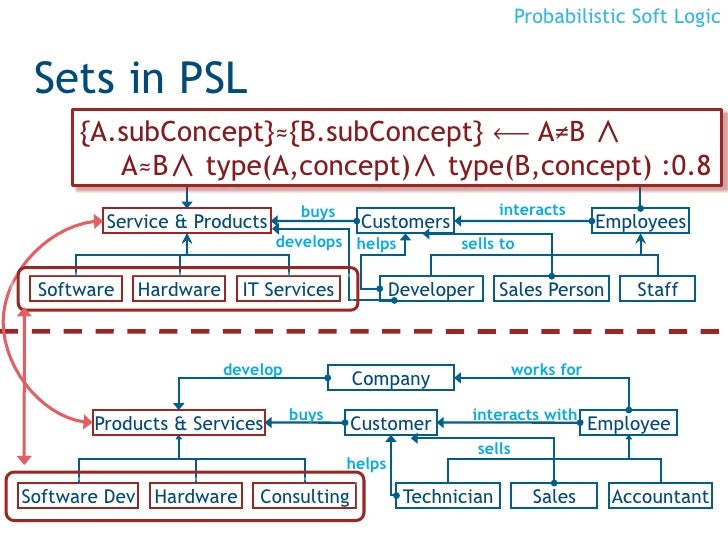Probabilistic Soft Logic
(Redirected from PSL)
Jump to navigation
Jump to search
A Probabilistic Soft Logic is a probabilistic logic language.
- Context:
- It can be used to define PSL Programs (composed of PSL rules, PSL sets, PSL constraints, and PSL atoms).
- It can be suited to Collective Probabilistic Inference Problems.
- Example(s):
- Counter-Example(s):
- See: Hinge Loss MRF, Markov Random Fields.
References
2016
- (Nickel et al., 2016) ⇒ Maximilian Nickel, Kevin Murphy, Volker Tresp, and Evgeniy Gabrilovich. (2016). “A Review of Relational Machine Learning for Knowledge Graphs.” In: Proceedings of the IEEE, 104(1). doi:10.1109/JPROC.2015.2483592
- QUOTE: … If one restricts the class of potential functions to be just disjunctions (using or and not, but no and), then one obtains a (special case of) hinge loss MRF (HL-MRFs) (Bach et al., 2015), for which efficient convex algorithms can be applied, based on a continuous relaxation of the binary random variables. Probabilistic soft logic (PSL) (Kimming et al, 2012) provides a convenient form of ‘‘syntactic sugar’’ for defining HL-MRFs, just as MLNs provide a form of syntactic sugar for regular (boolean) MRFs. HL-MRFs have been shown to scale to fairly large knowledge bases (Pujara et al., 2015). ...
2016
- https://github.com/linqs/psl/wiki/Glossary
- Hinge-loss Markov random field: A factor graph defined over continuous variables in the [0,1] interval with (log) factors that are hinge-loss functions. Many classes in PSL work together to implement the functionality of HL-MRFs, but the class for storing collections of hinge-loss potentials, which define HL-MRFs, is GroundRuleStore.java.
- Ground atom: A logical relationship corresponding to a random variable in a HL-MRF. For example, Friends("Steve","Jay") is an alias for a specific random variable. Implemented in GroundAtom.java.
- Random variable atom: A ground atom that is unobserved, i.e., no value is known for it. A HL-MRF assigns probability densities to assignments to random variable atoms. Implemented in RandomVariableAtom.java.
- Observed atom: A ground atom that has an observed, immutable value. HL-MRFs are conditioned on observed atoms. Implemented in ObservedAtom.java.
- Atom: A generalization of ground atoms that allow logical variables as placeholders for constant arguments. For example, Friends("Steve", A) is a placeholder for all the ground atoms that can be obtained by substituting constants for the logical variable A. Implemented in Atom.java.
- PSL Program: A set of rules, each of which is a template for hinge-loss potentials or hard linear constraints. When grounded over a base of ground atoms, a PSL program induces a HL-MRF conditioned on any specified observations. Implemented in Model.java.
- Rule:
- Logical rule:
- Arithmetic rule:
- Unweighted rule:
- Weighted rule:
- Data Store: An entire data repository, such as a relational database management system (RDBMS). Implemented in DataStore.java.
- Partition: A logical division of ground atoms in a data store. Implemented in Partition.java.
- Database: A logical view of a data store, constructed by specifying a write partition and one or more read partitions of a data store. Implemented in Database.java.
- Open Predicate: A predicate whose atoms can be random variable atoms, i.e., unobserved. The only time a ground atom will be loaded as a random variable atom is when it is stored in the database's write partition and its predicate is not specified as closed. Otherwise it will be loaded as an observed atom. Whether a predicate is open or closed is specific to each database.
- Closed Predicate: A predicate whose atoms are always observed atoms. The only time a ground atom will be loaded as a random variable atom is when it is stored in the database's write partition and its predicate is not specified as closed. Otherwise it will be loaded as an observed atom. Whether a predicate is open or closed is specific to each database.
2015
- (Bach et al., 2015) ⇒ Stephen H Bach, Matthias Broecheler, Bert Huang, and Lise Getoor. (2015). “Hinge-loss Markov Random Fields and Probabilistic Soft Logic.” In: arXiv preprint arXiv:1505.04406.
- QUOTE: A fundamental challenge in developing high-impact machine learning technologies is balancing the ability to model rich, structured domains with the ability to scale to big data. …
… The second new formalism, probabilistic soft logic (PSL), is a probabilistic programming language that makes HL-MRFs easy to define using a syntax based on first-order logic.
- QUOTE: A fundamental challenge in developing high-impact machine learning technologies is balancing the ability to model rich, structured domains with the ability to scale to big data. …
2012
- (Kimmig et al., 2012) ⇒ Angelika Kimmig, Stephen Bach, Matthias Broecheler, Bert Huang, and Lise Getoor. (2012). “A Short Introduction to Probabilistic Soft Logic.” In: Proceedings of the NIPS Workshop on Probabilistic Programming: Foundations and Applications.
